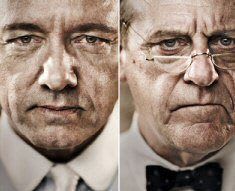There is nothing to beat a good old-fashioned American courtroom drama. Twelve Angry Men is the best of all but this perfectly-judged Sir Trevor Nunn revival of a largely 1955 play based on the Scopes "Monkey" Trial provides stiff competition.
At its centre, like a couple of heavyweight prize fighters, stand Kevin Spacey, who has rarely been seen to better effect and David Troughton whose performance is almost at the same pitch.
There is far more to Inherit the Wind, a play on which no fewer than four films have been based, than a verbal duel. The play addresses one of the most important issues of human existence, the debate between the Creationists and the Evolutionists, each with their own holy book, the Bible on one side and Darwin's The Origin of Species on the other.
On a wood-lined, deep but narrowed set, a whole, hysterical town called (Heavenly) Hillsboro is created by a cast big enough for a multi-million pound musical.
Initially, they pray and show horror at the behaviour of local schoolteacher, Sam Phillips' Bertram Cates who illegally taught his pupils that the bible was not literally true. This may seem far-fetched today but back in the Deep South 84 years ago, nobody dared question the word of the Lord.
The names may be changed but the biographies have hardly been tampered with, as three of the biggest names of the period descended on the town.
Mark Dexter as E.K. Hornbeck, in reality the journalist and acidic but always poetic wit H.L. Mencken, arrived to report cynically in the press and make snide remarks.
Next off the train into Tennessee came Matthew Harrison Brady (William Jennings Bryan played by the jutting-jawed Troughton) for the prosecution. This three-time failed presidential candidate is the proudest of men, buoyed by unshakeable faith in both his maker and himself as he defends "the living truth of the scriptures".
His Machiavellian opponent Henry Drummond was based on the legendary Clarence Darrow, a wry irreverent septuagenarian with a wicked grin, a character previously played in a silver screen biopic by Kevin Spacey.
The joy of the best courtroom plays is that they combine incredible tension with moments of high comedy. Even better, one can learn painlessly about both sides of an argument.
Under the rather biased gavel of the Judge, played by Nicholas Jones, Brady pontificates about the bible, puffing out an already substantial chest with pride every time he speaks.
For the forces of evil/common-sense, the cussed Drummond's style is different, avoiding the killer blows but getting in the kind of constant quick jabs that will eventually tire and then finish off an opponent.
The impassioned advocacy on both sides is wonderful to behold in the hands of these excellent actors, helped no end by the decision to place the jury in the front row of the stalls, effectively making the audience their surrogates. This builds to an incredible courtroom coup that Darrow pulled off in the actual trial.
In one of the few false moments of the play, the outcome is symbolically represented in an inappropriately heavy-handed fashion, following the final knockout blow in a trial that would eventually change not only America but the world.
The only reason why Inherit the Wind, a title taken from wise Solomon, is not regularly produced must be the size of the cast. While this creative team strive for and get close to perfection in 2¾ hours of almost undiluted pleasure, it would still be a fine entertainment with a lesser cast and surely this success will inspire others to try for themselves.
This is what theatre should be. A meaningful debate packed with comedy and pathos featuring acting of the highest quality. Who could ask for anything more?
